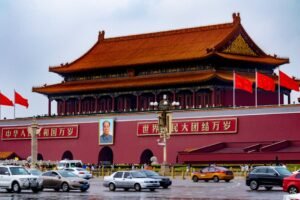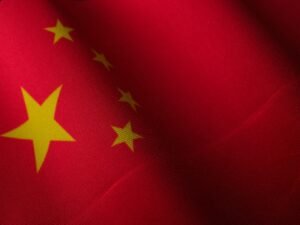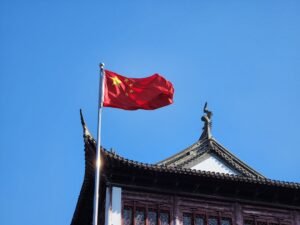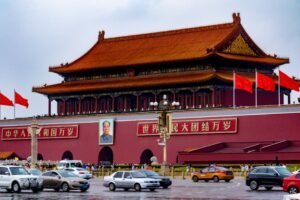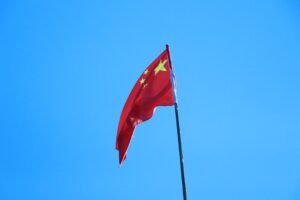In today’s rapidly evolving global economy, China stands as a powerhouse of innovation and economic growth. For professionals and entrepreneurs looking to engage with this dynamic market, mastering business Chinese is no longer just an advantage—it’s a necessity. At LC Chinese School, we understand the importance of equipping learners with the language skills needed to navigate China’s modern business landscape. Our flexible classes are tailored to busy professionals, helping you gain the linguistic edge you need. Explore our flexible class options and start your journey today at https://lcchineseschool.com/flexible-classes/.
Table of Contents
ToggleThe Evolution of China’s Economy
China’s economic journey from being the “world’s factory” to a leader in fintech and innovation is nothing short of remarkable. This transition is reflected in the Chinese language itself, with new terms and concepts emerging to describe cutting-edge industries and practices.
From Manufacturing to High-Tech
In the past, when discussing China’s economic strengths, one might use phrases like:
- 制造业 (zhì zào yè) – manufacturing industry
- 世界工厂 (shì jiè gōng chǎng) – world’s factory
- 劳动密集型产业 (láo dòng mì jí xíng chǎn yè) – labor-intensive industry
- 加工贸易 (jiā gōng mào yì) – processing trade
Today, however, the conversation has shifted. Modern business Chinese includes terms like:
- 人工智能 (rén gōng zhì néng) – artificial intelligence
- 区块链技术 (qū kuài liàn jì shù) – blockchain technology
- 大数据 (dà shù jù) – big data
- 云计算 (yún jì suàn) – cloud computing
- 物联网 (wù lián wǎng) – Internet of Things (IoT)
The Rise of E-commerce and Digital Payments
China’s e-commerce revolution has given rise to a whole new vocabulary. Consider this dialogue between two business partners:
A: 我们需要优化我们的移动支付系统,跟上市场步伐。 (Wǒmen xūyào yōuhuà wǒmen de yídòng zhīfù xìtǒng, gēn shàng shìchǎng bùfá.) We need to optimize our mobile payment system to keep up with the market.
B: 没错,现在连街边小贩都用支付宝和微信支付。我们不能落后。 (Méi cuò, xiànzài lián jiē biān xiǎo fàn dōu yòng zhīfùbǎo hé wēixìn zhīfù. Wǒmen bù néng luòhòu.) That’s right, even street vendors now use Alipay and WeChat Pay. We can’t fall behind.
A: 我们还应该考虑发展跨境电商业务,拓展国际市场。 (Wǒmen hái yīnggāi kǎolǜ fāzhǎn kuà jìng diàn shāng yèwù, tà zhǎn guójì shìchǎng.) We should also consider developing cross-border e-commerce business to expand into international markets.
B: 好主意。我们可以利用直播带货和社交电商来吸引年轻消费者。 (Hǎo zhǔyì. Wǒmen kěyǐ lìyòng zhí bō dài huò hé shè jiāo diàn shāng lái xī yǐn nián qīng xiāo fèi zhě.) Good idea. We can use livestream shopping and social e-commerce to attract young consumers.
This conversation introduces key terms:
- 移动支付 (yídòng zhīfù) – mobile payment
- 支付宝 (zhīfùbǎo) – Alipay
- 微信支付 (wēixìn zhīfù) – WeChat Pay
- 跨境电商 (kuà jìng diàn shāng) – cross-border e-commerce
- 直播带货 (zhí bō dài huò) – livestream shopping
- 社交电商 (shè jiāo diàn shāng) – social e-commerce
Navigating the Start-up Ecosystem
China’s start-up scene is booming, and with it comes a unique set of terms and phrases. Entrepreneurs and investors need to be familiar with concepts like:
- 独角兽公司 (dú jiǎo shòu gōng sī) – unicorn company
- 天使投资 (tiān shǐ tóu zī) – angel investment
- 融资轮 (róng zī lún) – funding round
- 商业模式 (shāng yè mó shì) – business model
- 孵化器 (fū huà qì) – incubator
- 加速器 (jiā sù qì) – accelerator
Consider this example of a pitch meeting:
Entrepreneur: 我们的初创公司专注于发展共享经济模式,结合人工智能技术。 (Wǒmen de chū chuàng gōng sī zhuān zhù yú fā zhǎn gòng xiǎng jīng jì mó shì, jié hé rén gōng zhì néng jì shù.) Our startup focuses on developing a sharing economy model, combined with AI technology.
Investor: 有意思。你们的盈利模式是什么?你们如何看待市场竞争? (Yǒu yì si. Nǐmen de yíng lì mó shì shì shénme? Nǐmen rú hé kàn dài shì chǎng jìng zhēng?) Interesting. What’s your profit model? How do you view market competition?
Entrepreneur: 我们采用’免费增值’策略,基础服务免费,高级功能收费。我们的AI技术给我们带来了独特的竞争优势。 (Wǒmen cǎi yòng ‘miǎn fèi zēng zhí’ cè lüè, jī chǔ fú wù miǎn fèi, gāo jí gōng néng shōu fèi. Wǒmen de AI jì shù gěi wǒmen dài lái le dú tè de jìng zhēng yōu shì.) We adopt a ‘freemium’ strategy, with basic services free and charges for premium features. Our AI technology gives us a unique competitive advantage.
Investor: 明白了。你们考虑过如何扩展到海外市场吗?有没有考虑过与大型科技公司合作? (Míng bái le. Nǐmen kǎo lǜ guò rú hé kuò zhǎn dào hǎi wài shì chǎng ma? Yǒu méi yǒu kǎo lǜ guò yǔ dà xíng kē jì gōng sī hé zuò?) I see. Have you considered how to expand into overseas markets? Have you thought about collaborating with large tech companies?
The Language of Fintech
Financial technology, or fintech, is reshaping the way business is conducted in China. Professionals in this field need to be familiar with terms such as:
- 数字货币 (shù zì huò bì) – digital currency
- 在线借贷 (zài xiàn jiè dài) – online lending
- 智能投顾 (zhì néng tóu gù) – robo-advisor
- 监管科技 (jiān guǎn kē jì) – regtech (regulatory technology)
- 区块链金融 (qū kuài liàn jīn róng) – blockchain finance
- 众筹 (zhòng chóu) – crowdfunding
Here’s an example of how these terms might be used in a business meeting:
Manager: 我们需要开发一个智能投顾平台,以吸引年轻投资者。同时,我们也要关注数字货币的发展趋势。 (Wǒmen xūyào kāi fā yí gè zhì néng tóu gù píng tái, yǐ xī yǐn nián qīng tóu zī zhě. Tóng shí, wǒmen yě yào guān zhù shù zì huò bì de fā zhǎn qū shì.) We need to develop a robo-advisor platform to attract young investors. At the same time, we should also pay attention to the development trends of digital currencies.
Team Member: 好主意。我们还应该考虑加入区块链技术,提高交易的安全性和透明度。 (Hǎo zhǔ yì. Wǒmen hái yīng gāi kǎo lǜ jiā rù qū kuài liàn jì shù, tí gāo jiāo yì de ān quán xìng hé tòu míng dù.) Good idea. We should also consider incorporating blockchain technology to enhance transaction security and transparency.
Manager: 没问题,但我们必须确保符合所有的监管要求。我们可能需要投资一些监管科技解决方案。 (Méi wèn tí, dàn wǒmen bì xū què bǎo fú hé suǒ yǒu de jiān guǎn yāo qiú. Wǒmen kě néng xū yào tóu zī yì xiē jiān guǎn kē jì jiě jué fāng àn.) No problem, but we must ensure compliance with all regulatory requirements. We may need to invest in some regtech solutions.
Sustainability and Green Business
As China takes steps to address environmental concerns, a new vocabulary around sustainability and green business has emerged:
- 可持续发展 (kě chí xù fā zhǎn) – sustainable development
- 碳中和 (tàn zhōng hé) – carbon neutrality
- 循环经济 (xún huán jīng jì) – circular economy
- 绿色金融 (lǜ sè jīn róng) – green finance
- 可再生能源 (kě zài shēng néng yuán) – renewable energy
- 环保科技 (huán bǎo kē jì) – environmental protection technology
These concepts are increasingly important in business discussions:
Executive: 我们公司正在努力实现碳中和目标,这是我们可持续发展战略的核心。 (Wǒmen gōng sī zhèng zài nǔ lì shí xiàn tàn zhōng hé mù biāo, zhè shì wǒmen kě chí xù fā zhǎn zhàn lüè de hé xīn.) Our company is working hard to achieve carbon neutrality goals, which is the core of our sustainable development strategy.
Partner: 那太好了。你们有考虑发行绿色债券来融资吗?这在绿色金融领域越来越受欢迎。 (Nà tài hǎo le. Nǐmen yǒu kǎo lǜ fā xíng lǜ sè zhài quàn lái róng zī ma? Zhè zài lǜ sè jīn róng lǐng yù yuè lái yuè shòu huān yíng.) That’s great. Have you considered issuing green bonds for financing? This is becoming increasingly popular in the green finance sector.
Executive: 是的,我们正在探索各种绿色金融工具。我们还在投资可再生能源项目,以减少我们的碳足迹。 (Shì de, wǒmen zhèng zài tàn suǒ gè zhǒng lǜ sè jīn róng gōng jù. Wǒmen hái zài tóu zī kě zài shēng néng yuán xiàng mù, yǐ jiǎn shǎo wǒmen de tàn zú jī.) Yes, we’re exploring various green financial instruments. We’re also investing in renewable energy projects to reduce our carbon footprint.
Mastering Business Etiquette
Understanding the language of modern Chinese business goes beyond vocabulary—it also involves mastering cultural nuances and etiquette. Here are some key phrases for business interactions:
- 很高兴认识您 (Hěn gāo xìng rèn shi nín) – Pleased to meet you
- 打扰了 (Dǎ rǎo le) – Sorry to bother you
- 请多关照 (Qǐng duō guān zhào) – Please give me your guidance and support
- 合作愉快 (Hé zuò yú kuài) – Happy cooperation
- 敬请指教 (Jìng qǐng zhǐ jiào) – Please give me your advice/guidance
- 共创双赢 (Gòng chuàng shuāng yíng) – Create a win-win situation together
Consider this exchange at a business dinner:
Host: 请慢用。我们敬您一杯,感谢您的支持。希望我们能够共创双赢的局面。 (Qǐng màn yòng. Wǒmen jìng nín yì bēi, gǎn xiè nín de zhī chí. Xī wàng wǒmen néng gòu gòng chuàng shuāng yíng de jú miàn.) Please enjoy the meal. We’d like to propose a toast to thank you for your support. We hope we can create a win-win situation together.
Guest: 非常感谢。我相信我们的合作会很成功。请多关照。 (Fēi cháng gǎn xiè. Wǒ xiāng xìn wǒmen de hé zuò huì hěn chéng gōng. Qǐng duō guān zhào.) Thank you very much. I believe our cooperation will be very successful. Please give me your guidance and support.
Host: 太客气了。让我们共同努力,一起迎接未来的挑战和机遇。干杯! (Tài kè qi le. Ràng wǒmen gòng tóng nǔ lì, yì qǐ yíng jiē wèi lái de tiǎo zhàn hé jī yù. Gān bēi!) You’re too kind. Let’s work together to meet future challenges and opportunities. Cheers!
Grammar Focus: Business-Related Structures
To effectively communicate in a business context, it’s crucial to master certain grammatical structures. Here are a few examples:
- Using 需要 (xūyào) to express necessity: 我们需要扩大市场份额。 (Wǒmen xūyào kuò dà shì chǎng fèn’é.) We need to expand our market share.
- The 不仅…而且 (bù jǐn… ér qiě) structure for emphasis: 我们不仅要提高效率,而且要降低成本。 (Wǒmen bù jǐn yào tí gāo xiào lǜ, ér qiě yào jiàng dī chéng běn.) We not only need to improve efficiency but also reduce costs.
- Using 虽然…但是 (suī rán… dàn shì) for concession: 虽然市场竞争激烈,但是我们有独特的优势。 (Suī rán shì chǎng jìng zhēng jī liè, dàn shì wǒmen yǒu dú tè de yōu shì.) Although market competition is fierce, we have unique advantages.
- The 既…又 (jì… yòu) structure for describing multiple characteristics: 我们的产品既环保又实用。 (Wǒmen de chǎn pǐn jì huán bǎo yòu shí yòng.) Our product is both environmentally friendly and practical.
- Using 为了 (wèi le) to express purpose: 为了提高市场占有率,我们将加大营销投入。 (Wèi le tí gāo shì chǎng zhàn yǒu lǜ, wǒmen jiāng jiā dà yíng xiāo tóu rù.) In order to increase our market share, we will increase our marketing investment.
Essential Business Chinese Vocabulary List
To help you get started, here’s an expanded list of essential business Chinese terms:
- 市场 (shì chǎng) – market
- 利润 (lì rùn) – profit
- 投资 (tóu zī) – investment
- 谈判 (tán pàn) – negotiation
- 股东 (gǔ dōng) – shareholder
- 营销 (yíng xiāo) – marketing
- 创新 (chuàng xīn) – innovation
- 战略 (zhàn lüè) – strategy
- 竞争对手 (jìng zhēng duì shǒu) – competitor
- 合同 (hé tong) – contract
- 品牌 (pǐn pái) – brand
- 风险管理 (fēng xiǎn guǎn lǐ) – risk management
- 股票 (gǔ piào) – stock
- 融资 (róng zī) – financing
- 并购 (bìng gòu) – mergers and acquisitions
- 供应链 (gōng yìng liàn) – supply chain
- 市场份额 (shì chǎng fèn’é) – market share
- 商业模式 (shāng yè mó shì) – business model
- 企业文化 (qǐ yè wén huà) – corporate culture
- 可持续发展 (kě chí xù fā zhǎn) – sustainable development
Conclusion
Mastering business Chinese for the modern era is an ongoing process that requires dedication and practice. As China’s economy continues to evolve, so too does the language used to describe its various sectors and innovations. By staying current with these linguistic developments, you’ll be better equipped to engage with Chinese partners, negotiate deals, and understand market trends.
Remember, language learning is a journey, and having the right guidance can make all the difference. At LC Chinese School, we offer flexible classes designed to help busy professionals like you master the intricacies of business Chinese. Whether you’re a beginner or looking to refine your advanced skills, our experienced instructors can help you achieve your language goals.
Ready to take your business Chinese to the next level? Explore our flexible class options and start your journey today at https://lcchineseschool.com/flexible-classes/. With dedication and the right resources, you’ll be conversing confidently about everything from traditional manufacturing to cutting-edge fintech in no time!
By immersing yourself in the language of modern Chinese business, you’ll open doors to new opportunities and gain a deeper understanding of one of the world’s most dynamic economies. Don’t let language be a barrier to your professional success in China. Start your learning journey with LC Chinese School today and position yourself for success in the ever-evolving landscape of global business.



